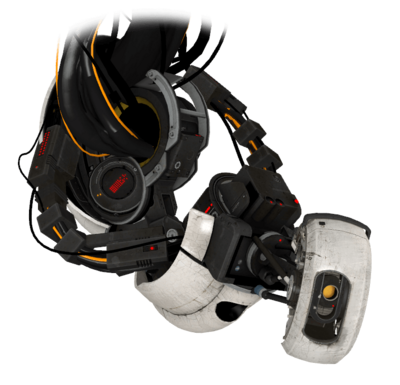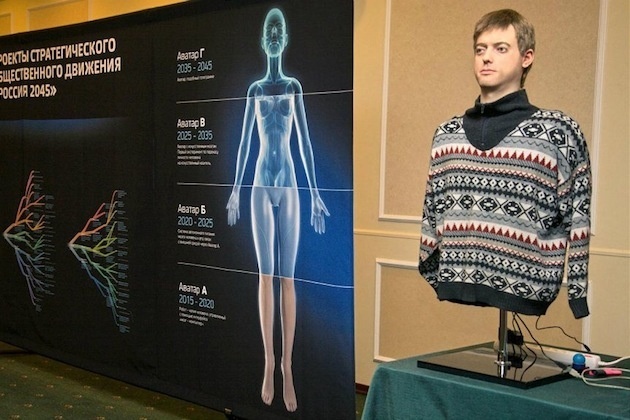http://www.youtube.com/watch?v=xb50sF7oEGA

Posted on 06/16/2013 2:00:38 PM PDT by nickcarraway
Neuroscientists Say Dimitry Itskov's Plan Is Not Realistic
A Russian multimillionaire said he would like to see the technology to allow humans to outlive their bodies made into a reality – to the point where “people” with artificial computer-driven brains and hologram bodies would exist in a mere 32 years.
Dmitry Itskov was at Lincoln Center Saturday for his Global Future 2045 conference. Itskov, who looks younger than his 32 years, has an aggressive timetable in which he’d like to see milestones toward that goal met:
— By 2020 – a mere seven years away — robots we can control remotely with our brains.
— By 2025, a scenario familiar to watchers of sci-fi cartoon show “Futurama:” the capability to transplant the brain into a life-support system, which could be a robot body. Essentially, a robot prosthesis that can replace an ailing, perhaps dying body.
— By 2035, the ability to move the mind into a computer, eliminating the need for the robot bodies to carry around wet, messy brains.
— By 2045, technology nirvana in the form of artificial brains controlling insubstantial, hologram bodies.
Itskov has promoted his idea as the next step in human evolution, or “neo-humanity,” according to a Vice Magazine report. He has even formed his own political party in Russia, called “Evolution 2045.”
Testimony by neuroscience experts at the conference indicated that Itskov’s timetable was ambitious to the point of being unrealistic.
Still the gathering was a rare public airing of questions that will face us as technology progresses.
Is immortality desirable, and if so, what’s the best way to get there? Do we leave behind something essentially human if we leave our bodies behind? If you send your robot copy to work, do you get paid?
Japanese robotics researcher Hiroshi Ishiguro’s presentation started out with a life-size, like-like robot representation of himself on stage.
The robot moved its lips, nodded and moved it eyes while a hidden loudspeaker played up Ishiguro’s voice. Apart from a stiff posture and a curious splay of the hands, the robot could be mistaken for a human, at least 10 rows from the stage.
Ishiguro uses this android or “Geminoid” (after the Latin word for “twin”) to meet with students at a research institute two hours away from the laboratory where he also has an appointment. He controls it through the Internet, and sees his students through a webcam.
“The problem is, if I use this android, the research institute says it cannot pay for me,” Ishiguro said, to laughter from the audience of hundreds of journalists, academics, Buddhist monks and futurism enthusiasts.
Ishiguro flew to the U.S. with his robotic twin’s head, the most valuable part, in the carry-on luggage. The body rode below, in the luggage compartment.
To Itskov, who made his money in the Russian Internet media business, the isolated achievements of inventors like Ishiguro are not enough. He wants to create a movement, involving governments and the United Nations, to work toward a common goal.
“We shouldn’t just observe the wonderful entrepreneurs — we need to move ahead systematically,” Itskov said in an interview. “We are really at the time when technology can affect human evolution. I want us to shape the future, bring it up for public discussion, and avoid any scenario that could damage humanity.”
Itskov says he tries to eliminate his “selfishness” day by day, and has spent about $3 million promoting his vision. He organized the first conference on the theme in Russia last year.
But in bringing the idea to the U.S., a cultural difference is apparent: Itskov’s desire for a shared, guiding vision for humanity does not mesh well with the spirit of the American high-tech industry, which despises government involvement and prizes its freedom to pursue whatever projects it wants.
Space entrepreneur and X-Prize Chairman Peter Diamandis articulated that spirit at the conference; the freewheeling capitalist system, he said, is one of the strongest engines for effecting change.
“The rate of change is going so fast, I do not believe any of our existing government systems can handle it,” he said.
Archbishop Lazar Puhalo of the Orthodox Church in America, who has a background in neurobiology and physics, offered another critique at the conference.
“A lot of this stuff can’t be done,” he said.
If it can be done, that’s not necessarily a good thing either, the robed and bearded patriarch believes.
“I’m not too fond of the idea of immortality, because I think it will be deathly boring,” he said, with a twinkle in his eyes. Giving up our bodies could also be problematic, he said.
“There’s a lot of stuff in them that makes us human. I’m not sure they can be built into machines,” Puhalo said.
Itskov acknowledges that his vision would leave part of the human experience behind. But he believes it would be worth it.
“We’re always losing something for what we’re doing. We’re always paying,” Itskov said.
Even if not totally successful as intended, the artificial brains may just be the edge required in the Zombie Apocalypse.
I wouldn’t want immortality. I wouldn’t want to be super rich, either.

Itskov modeled as an avatar at Russia 2045's 2012 conference
Forbidden planet, The Krell were about to gain this dream until the ugly ID raised its head!
Great for deep space travel but I wonder if it might be more humane if you could do it without personality. If we could transfer the intelligence and thinking processes it would be better.
There’s plenty of time for ponderin because I think 2045 is a wildly optimistic timeline. I think 200 years from now is a maybe and even that would be optimistic.
I’ve actually done a fair amount of thinking about this myself as a possible sci fi project. Imagine if you could transfer your consciousness to a couple of dozen near eternal robots for a mission to a distant planet. Meanwhile you could be in hyper sleep for however many thousands of years it took to get there.
When you awoke, I wonder how different you would be from the robot copies of yourself. Especially if they’ve had thousands of years of new experiences and memories. Also each individual robot would also have its own distinct and individual experiences and memories.
Another possibility is human robots taking frozen embryos to a distant planet and raising and teaching the first few generations.
Just the sort of thing I think about in the dark of night.
Immortality would solve one problem - when the birth rate drops to near zero, it would insure that consumers would still be there to keep the economy going in human terms.
But one wonders: When does “immortality” proceed to “immorality”? We are moral because we are NOT immortal.
My guess is, the Creator of the universe is lol’ing about this...
Sounds like a James Bond movie.
“...it is appointed unto men once to die, but after this the judgement..”
Hebrews 9:27
“Another possibility is human robots taking frozen embryos to a distant planet and raising and teaching the first few generations.”
This is an excellent idea for a story. It seems like it could be a sequel of sorts to Blade Runner.
“— By 2045, technology nirvana in the form of artificial brains controlling insubstantial, hologram bodies.”
— By 2084, they will become to be known as the Robotrons. They will work to wipe out humanity ... including Mikey.

2045 to “artificial brains?” The Russian is a Luddite. I peg the date for that threshold much sooner than that.
The bots would need to be hardwired with a constitutional “prime directive” and would need solid control of things till a society was functional and the humans could run the show. After that the bots could act as judges with a solid constitutional base.
>> I peg the date for that threshold much sooner than that.
You have a point, especially considering how fast the threshold for what is considered human intelligence is falling...
I wonder what will be on the teevee in 2045. I predict programs will consist of a kaleidoscopic light show with some erotic babbling in the background — in between “soma” commercials.
I think a more realistic goal is to shoot for a human brain “mirror”. That is, record everything a person observes and says, their decisions, their timing, their conversations, writings, patterns, routines and habits, speech, interactions, etc., over the course of a decade.
Then try to convert it into an elaborate algorithm, compressed, and continually calculating on their next action and behavior, narrowing things down until it can generally predict what they are going to do.
Then, because human memory is awful, augment with actual sources. So, for example, the person reads a book and just remembers snippets, highlights, or what they read. The computer has the whole book as a reference, yet can filter it through their algorithm.
Eventually, what you get won’t be that person, but a facsimile that could fill in for them much of the time, in the vast majority of situations that don’t require much creativity.
Can you imagine all the updates, patches and blue screens of death in your artificial brain?
Disclaimer: Opinions posted on Free Republic are those of the individual posters and do not necessarily represent the opinion of Free Republic or its management. All materials posted herein are protected by copyright law and the exemption for fair use of copyrighted works.